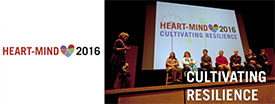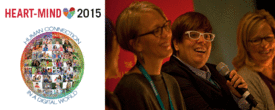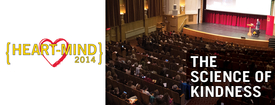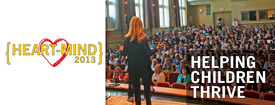Breakout Sessions
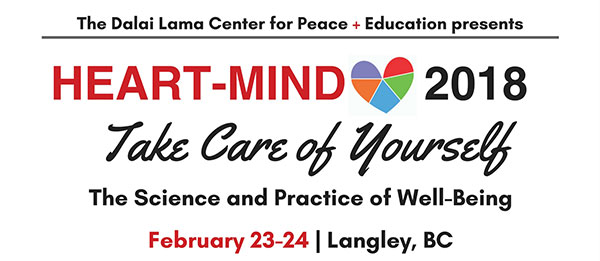
Heart-Mind 2018 registrants can choose either a Big Conversation Small Group session with one of the conference Keynote Presenters or one of the 16 Workshops offered.
Big Conversation Small Group Sessions
Attend a Big Conversations, Small Groups session with either Dan Siegel, Rick Hanson, Patricia Jennings, Kim Schonert-Reichl, or Chastity Davis. Participants will have the opportunity to engage in a more intimate breakout session which will involve a facilitated dialogue with one of these featured presenters, to deepen knowledge and understanding of the presenter's work and thinking, and to explore new understanding and ideas.
![]()
Workshops
Workshop 1: Managing Stress for Children and Adults
Cindy Andrew - Consultant, Psychology Foundation of Canada
Stress is not always a bad thing. We need a certain amount of stress to feel energized and engaged in life and its challenges. Stress becomes a problem when we experience too much of it for too long or when we cannot recover from stress. This workshop will share some research-backed strategies that can be put into practice in our personal lives where we live, work, and play. Participants will learn about psychologically sound strategies to manage stress and foster resiliency, and will be introduced to Canadian research-based web resources and strategies for helping adults and children cope with stress and foster an environments favorable to mental health.
Audience: Teachers, counsellors, parents, public health professionals
Workshop 2: Awakening the Well-being of Educators
Lisa Baylis - Secondary School Counsellor, Greater Victoria School District
This workshop will explore tools and strategies focused on mindfulness, gratitude, compassion, kindness and well-being to help participants create wellness habits for themselves first, and then within their school. The workshop will help participants train their brain for the positive, which builds a ripple effect of well-being in the school setting and enables a culture of resiliency, self-regulation and awareness for all learners. Attendees will learn strategies to improve their own well-being and sustainable happiness. They will gain a better understanding of why improving their own wellness impacts other people in their lives, including the students they work with in schools.
Audience: Educators, parents
Workshop 3: I Want to Work at THAT School: Creating Happy Work Environments
Kristi Blakeway - School Principal | Sherri Skerratt - District Counsellor, Maple Ridge School District
The moment you walk through the front door of a school you can feel the culture. You know within seconds whether or not a school is one you want to work in. In partnership with Dr. Kimberly Schonert-Reichl, the Maple Ridge School District has made a commitment to keep Social Emotional Learning at the foundation of what we do. Our key to success? Start with the adults. This workshop will offer practical strategies to turn your school and your district into a work place that sparks joy, takes care of the adults and sets a strong foundation for learning. When we take care of ourselves, we are ready to care for our students. Participants will leave with new ideas they can use tomorrow to improve their own levels of happiness in their personal and professional lives.
Audience: K-12 educators
Workshop 4: Designing Your Life: A Group Coaching Workshop
Dr. Catherine Carr - Executive Coach and Clinical Counsellor
Sometimes it seems like something is not quite right or something could be even better with our career, relationships, health or interests. It is important to take the time to sit back and reflect on how to bring more alignment, joy and resiliency into our lives. This experiential coaching session, based on Designing your Life, a book by Dave Evans and Bill Burnett, brings together reflection, creative envisioning, and coaching. Participants will leave with an understanding of how to use design principles and coaching to reflect on and redesign one’s work, play, health or relationships.
Audience: Everyone
Workshop 6: Coping with Worries and Fear
Larry Haberlin - Adjunct Professor of Medicine, University of British Columbia
We all have worries and fears that at times get in the way of our doing our best, managing stressful situations, and enjoying life. Cognitive behavioural skills and mindfulness approaches can give us the tools to be resilient and to increase our confidence. When we are able to develop and practice these skills and are also able to re-think our own stories of not being good enough, we can make courageous changes in our lives. In this workshop we will have a chance to make sense out of our stories based on our unfinished business from our past and experience skills and practices that promote strength and resilience. Participants will leave with a better awareness and understanding of their own worries and fears and how reducing these can improve work and home lives. The workshop will focus on the importance of having a caring and nurturing support group, remembering and sharing happy events, identifying, labeling and expressing feelings, turning worry and fear into helpful and life-affirming thoughts, and developing coping step plans to address major roadblocks to our sense of well-being.
Audience: Everyone
Workshop 8: The Whole Person in the Whole Community
Stacia Leech - Executive Director, Roberts Creek Community School Society
This workshop presents the challenges and opportunities for increasing well-being in systems. Participants will gain an understanding of moving from systems practice to program implementation, and will consider the sustainability and effectiveness of evidence-based wellness programs and practices in typical educational and community organization settings. They will engage in a hands-on experience of creating a simple mapping process to identify gaps and influencers and leverage points in a system. The workshop will facilitate a discussion about the importance of taking care of ourselves and modeling health and wellness behaviors.
Audience: Educators, directors of instruction, school district superintendents and assistant superintendents, health and wellness professionals, mental health workers
Workshop 9: Heart-Mind Well-Being: Taking Care of Self
Angela Low - Consultant, Dalai Lama Center for Peace and Education and Researcher, Social Emotional Education and Development (SEED), University of British Columbia
Based on the Dalai Lama Center’s Heart-Mind Well-Being framework, this workshop is designed to provide a practical and meaningful experience for adults to engage in their own social and emotional development, and develop strategies for self-care. In this experiential, interactive workshop, participants will be invited to experience some mindfulness exercises, and to engage in self-reflection to identify opportunities and barriers in caring for their own heart-mind well-being. Participants will learn about some key elements that impact their heart-mind well-being, and explore evidence-based tools and strategies for fostering stress resilience and self-compassion.
Audience: Parents, caregivers, educators, health professionals, students
Workshop 10: Trauma Informed Yoga: Caring for Oneself and Others
Nicole Marcia - Yoga Therapist, Founder and Director of Fine Balance Yoga
Experiencing trauma – from a distressful childhood to painful or other disruptive life events - can lead to isolation and a feeling of helplessness. Trauma informed yoga provides support to make us feel more at home in our bodies, and calmer and more confident in the world. This interactive presentation explores how our bodies and emotions inform one another and how and why yoga works. Participants will learn body-based, self-regulation techniques to support resilience and self-compassion. They will be better equipped to manage stress and trauma.
Experiencing trauma – from a distressful childhood to painful or other disruptive life events - can lead to isolation and a feeling of helplessness. Trauma informed yoga provides support to make us feel more at home in our bodies, and calmer and more confident in the world. This interactive presentation explores how our bodies and emotions inform one another and how and why yoga works. Participants will learn body-based, self-regulation techniques to support resilience and self-compassion. They will be better equipped to manage stress and trauma.
Audience: Anyone who wants to learn more about trauma informed yoga therapy and techniques for self-care and resilience
Workshop 11: Playshop: Catalyst for Creativity and Courage
Victoria Maxwell - Mental Health Speaker, Actor, and Writer
In this fun, interactive playshop, creativity is the conduit to experience and can support self-acceptance, self-compassion, and self-care. Through writing and creative exercises, simple improvisational games, and story sharing, participants will explore strategies to include in their wellness toolbox and practice the art of listening and being in the moment. Participants will also explore science-based creative exercises to promote self-care, reduce stress, build mental health and improve quality of life, as well as writing and story-sharing activities to cultivate self-compassion and kindness. No previous writing or improv experience required.
Audience: Educators, parents, health professionals, mental health and social workers, occupational therapists, business leaders, recreation professionals
Workshop 12: The Optimistic Leader: The Power of a Positive Workplace
Olivia McIvor - Business Leadership Expert
Kindness is a simple concept - too simple some might think to provide a solution to the complex challenges of work. But it is precisely this simplicity that gives kindness such power to affect harmonious change at all levels within individuals and organizations. One kindness character trait is resilience and this will be the emphasis of this session. Participants will look at resilience through the lens of optimism, which is to “make the best of” circumstances or a given situation by taking responsibility for the energy and vitality you bring to the space surrounding you. Participants will learn practical tools for creating a more positive and harmonious work/life environment and will be able to make critical links to how cultivating a positive and optimistic approach to their work/life is good for their health and well-being.
Audience: Everyone
Workshop 13: Parenting: Finding Calm and Peace at Home
Molly Stewart Lawlor - PhD Candidate, University of British Columbia
This session will explore how stress impacts family relationships and why parent self-care is a critical first step towards creating a more peaceful home. Participants will be introduced to self-care strategies that are grounded in the three components of self-compassion: self-kindness, mindfulness, and common humanity. Each component provides a springboard for simple self-care practices that can be integrated into daily life. By approaching challenges with self-compassion, parents can foster their own well-being and help build their children’s resilience by modelling, sharing, and practicing self-care together. Participants will also learn how they can foster positive connections with the entire family by incorporating practices such as the Danish concept of Hygge – creating meaningful time together. The strategies and resources provided in the workshop are intended to help parents reduce stress, boost well-being, and build family connection towards a calmer and peaceful home.
Molly Stewart Lawlor - PhD Candidate, University of British Columbia
This session will explore how stress impacts family relationships and why parent self-care is a critical first step towards creating a more peaceful home. Participants will be introduced to self-care strategies that are grounded in the three components of self-compassion: self-kindness, mindfulness, and common humanity. Each component provides a springboard for simple self-care practices that can be integrated into daily life. By approaching challenges with self-compassion, parents can foster their own well-being and help build their children’s resilience by modelling, sharing, and practicing self-care together. Participants will also learn how they can foster positive connections with the entire family by incorporating practices such as the Danish concept of Hygge – creating meaningful time together. The strategies and resources provided in the workshop are intended to help parents reduce stress, boost well-being, and build family connection towards a calmer and peaceful home.
Audience: Parents
Workshop 14: Compassionate Parents, Compassionate Kids
Suzanne Vardy - Registered Clinical Counsellor
What does it mean to parent with compassion? What does it mean to be compassionate towards ourselves as parents and why is this important? This workshop explores the different aspects of compassion, and considers the role of stress and how it impacts our ability to parent with compassion. Participants will become familiar with definitions and research on compassion and self-compassion, will understand how practicing self-compassion impacts parenting, and will learn ways to nurture compassion for themselves and with children.
Audience: Parents
Workshop 15: Social Emotional Learning (SEL) As A Core to Systems Leadership
Joanne Schroeder - Senior Policy Fellow | Pippa Rowcliffe- Deputy Director, Human Early Learning Partnership, University of British Columbia
Social Emotional Learning is a process by which we learn to develop a positive sense of self, manage emotions, set and achieve goals, make responsible decisions, act from a place of empathy and maintain respectful relationships. These are the skills that we hope for our children, and that we need as system leaders. This workshop will present an approach to building systems leadership for children of which adult well-being, personal mastery and social and emotional learning are core tenets. Presenters will outline specific skills and provide strategies for building these individually and within a group. We will learn about and practice activities such as intentional dialogues, reflective journaling, and peer mentorship. Participants will understand how social and emotional learning and adult well-being can foster leadership and systems change, and will gain practical skills for furthering their own well-being towards systems change.
Audience: Everyone
Workshop 16: Cultivating Compassion for Oneself
Magdalena Szpala - Compassion Cultivation Training Teacher
The ability to feel compassion for others is part of our human nature. Yet, directing compassion towards ourselves may be much more difficult. This workshop draws on the Compassion Cultivation Training curriculum developed at Stanford University’s Center for Compassion and Altruism Research and Education. Participants will understand what self-compassion is, why it can be challenging to achieve it, and will learn practical, science-based strategies for cultivating self-compassion.
Audience: Anyone interested in self-compassion, particularly professionals working with youth and children


